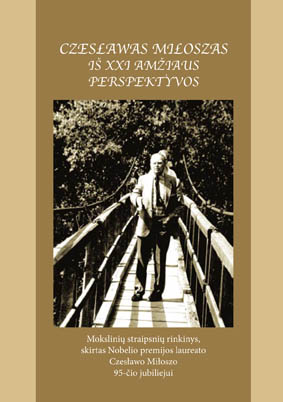Tarp Mickiewicziaus ir Miłoszo
Between Mickiewicz and Miłosz
Author(s): Anatol BrusevičSubject(s): Literary Texts
Published by: Vytauto Didžiojo Universitetas
Keywords: Czesław Miłosz; Adam Mickiewicz; konferencija; conference; Kaunas
Summary/Abstract: This article is mainly devoted to search of similarity and consistent patterns in oeuvre of the most famous polish poets – Adam Mickiewicz and Czesław Miłosz. It is remarkable that both of them are idiosyncratical symbols of Poland, but none of them can be regarded as a Pole in a full sense of this word. Thus Mickiewicz considered himself the national of Grand Duchy of Lithuania. But the truth is that at that time this state did not exist officially, and nevertheless it had preserved its cultural-historic image. It is paradox but great polish romantic did not consider Poland as his Motherland. He was born in Novogrudok (the territory of present Belarus) and from little up he was broken in Belarusian people’ culture and all his oeuvre had passed under the sign of region patriotism. Czesław Miłosz was born in Lithuania; he appeared in literature after Adam Mickiewicz one hundred later. Moral ideals and intellectual values of Grand Duchy of Lithuania epoch were not already so popular, but still had influence with poet’s creative consciousness. As Czesław Miłosz grew up almost at the same traditions as Adam Mickiewicz thus greatly expressed “domestic” patriotism is reside in Czesław Miłosz’ oeuvre. And one more important feature, which unites oeuvre of Miłosz and Mickiewicz is rare synthesis of historism and individualism in worldview w of the both poets. Thanks to exactly this synthesis Mickiewicz could identify Motherland with memories and dreams about it and Miłosz could identify homeland and native language. In general, the world of Miłosz and Mickiewicz poetry is a trend, nothing stays here at the same place. The problem of time and trend becomes more popular, symbolic problem of their oeuvre. By the way, the motive of fateful moving through time brings the poetry of both poets out of borders of polish literature: no one more polish writer has come to the circle of this problematic. Czesław Miłosz is certainly one of the greatest personalities of 20th century. It is proved by awarding him Nobel Prize in 1980 – the uppermost literature reward. This poet, prose writer and essayist made real revolution in present polish literature. At the same time one can see the features of tradition in Czesław Miłosz’ revolution that had been laid out by Adam Mickiewicz.
Journal: Česlovo Milošo skaitymai
- Issue Year: 2007
- Issue No: 1
- Page Range: 75-85
- Page Count: 11
- Language: Lithuanian

